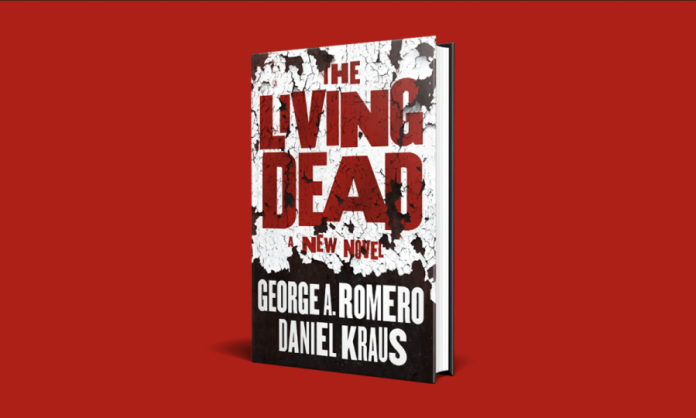Even though I’m a well-documented horror weenie, one of my all time favorite genres are zombie flicks. Seems ridiculously contradictory, doesn’t it. Even as I hate being scared, I’m normally one of the first in line to watch the latest zombie movie (well, back when we went to theaters). Of course, the whole genre–and the zombie’s relevance on pop-culture–owes a debt to George A. Romero. His original 60s indie film, Night of the Living Dead, ushered in the era and it’s grown ever since.
The Living Dead
Written By: Daniel Kraus, George A. Romero
Published By: TOR
Release Date: August 4, 2020
Purchase [Affiliate]: https://amzn.to/3sPny1R
The man never stopped dreaming of new zombie story ideas. Studios had long since stopped giving him the big budget to work with, so he began writing a novel, which would tell his biggest story yet. Sadly, he passed away in 2017, leaving it unfinished. Fortunately, TOR/MacMillan books turned to Daniel Kraus (who co-authored The Shape of Water and Trollhunters with Guillermo del Toro) to finish the novel.
Because of my love for the genre, and Romero’s films, I was very eager to see how The Living Dead managed to bring his final zombie vision to life. In some ways, it’s a sweeping epic, and in others it gets too much in its own way to tell a cohesive story…Let’s talk more.
Story Basics
The Living Dead is massive. Honestly, I wasn’t expecting it to be so big. I was shocked to unwrap the package it came in and discover an over 600 page hardcover, tome. That’s a whole lot of zombie action. It covers a decent period of time, ranging from the initial outbreak where it spends the bulk of the time (more than half the novel), to several years later as society is finding a way forward once more.
The novel centers on a broad group of characters: Etta, Greer, Charlene, The Face, and Nishimura. Each of from far flung corners of the country with nothing in common aside from having to endure the outbreak of the zombie virus taking over the planet.
In some ways, The Living Dead feels less like a single book and more like a compilation of short stories/novellas. Each of the characters have their own specific story of how they handled/survived the initial outbreak. From hunkering down in the last working television studio broadcasting news and updates, to a Navy aircraft carrier finding themselves caught in the fervor of a Priest gone mad; the stories are as varied and diverse as the people themselves. By and large these stories work independently of one another, with no connective tissue aside from happening in the same period of time.
Each story is engaging on its own. Every time the story jumped back to characters, I was eager to see how they would wrap up. It got to a point, however, where the overall book felt listless because of it.
No overarching plot came into focus in the final third of the novel. Without warning, the story jumps forward in time by at least 15 years. It’s such a sudden change, it threw me off guard, especially as it seemed to leave us right in the middle of their (interesting) stories.
We pick up in a new town, where survivors have banded together to try and create a new take on society. One free from the pitfalls of prior civilizations. Despite coming from different parts of the country, all of our people have managed to find themselves pulled together in this town, trying to put their pasts behind them.
There’s only one problem…an unlikely survivor, a narcissistic holdover from the days of yore has found his way into the village of “Fort York.” With him comes old, dangerous, ideas that threaten the peace the community has attained; not only with each other, but with the zombies themselves. I don’t want to get much further into spoilers, so I’ll leave the story bits at that.
Shifting Perspectives
As mentioned, The Living Dead is less a singular novel, and more like a compilation of different things. The latter part of the novel hammers this home. In many ways, it feels like a “sequel” of sorts to the stories we read in the first 2/3rds of the book, as we catch up with these characters much later in their lives.
The circumstances of their coming together are laid out in interlude style chapters (another distinct writing shift) as Etta, working as a historian in the new world, interviews these characters. The Q&A format helps fill in the gaps from where we left the characters before the time-shift. While I appreciated learning what happened next, it still felt odd to have such a strong tonal shift. We go from being thoroughly engaged with these characters and their struggles in the early weeks of the outbreak, to them listing off a set of basic “facts” to fill in the gaps for several years.
In some ways, it was intriguing to see them recount their own stories and seeing how their attitudes have shifted since we left them. On the other hand, however, I wanted to SEE those events play out in the story. Being told they survived, is dramatically different from experiencing it alongside them, which the novel initially did.
Where the beginning kept all the stories separate, the final act brings it all together in what feels like a different plot altogether. Instead of dealing with the onset of the zombies, they’re now experiencing a world on the brink of being RID of them. Nature is healing, zombies are less a threat than ever before, and beginning to die out.
It’s fascinating to see the dichotomy of this, something we rarely get in zombie stories. Again, it’s just strange to have it all happen in the same book. I feel like this could have easily been a series of books, telling stories even as it leads to the conclusion we get. Each individual aspect of the novel kept me highly engrossed, flipping the pages one after the other until I finished. Thrown together in a single book just feels off, however; almost like the authors couldn’t decide on the plot thread they wanted to follow, so just threw it all in there.
This isn’t necessarily a bad thing, but didn’t work for me as well as it might on others. While I felt each character’s story was great, with their own goals and purposes, I found myself continually waiting for the bigger story to come into focus. Because the time jump made an entirely new story crop up, I felt increasingly detached from the characters by the finale. As such, some of the more emotional moments lacked a bit of impact for me.
Of Zombies and Themes
Don’t get me wrong, there’s a LOT to enjoy in this book for fans of zombies. The writing expertly captures the gore and horror of the outbreak and felt like I was watching a movie the whole time. It was impressive to see how well Daniel Kraus captured the same tone/style of George A. Romero (who’d written roughly half of it before passing away). I honestly couldn’t tell you which parts of the story were handled by which author; it flows so well.
Even better, the story is littered with references to Romero’s zombie films. Even though it takes place in the modern day (social media and smartphones), the story does an excellent job of pulling together all of his works into one. It’s kind of a neat endcap to his work, essentially showing how all of his work is connected and manages to paint a definitive picture of the outbreak from beginning to end.
Romero is not a person of subtlety. Since Night of the Living Dead, his zombie tales have been heavy handed in their critiques on society. From racial injustice to class warfare, you always knew exactly how Romero felt about certain “norms” in civilization.
The Living Dead is similarly heavy handed in presenting it’s themes. Sometimes it glaringly over the top, as in the characters specifically think/say it out loud. There were times it threw me off guard, but honestly, I think people can do with a little more bluntness in regards to certain things.





